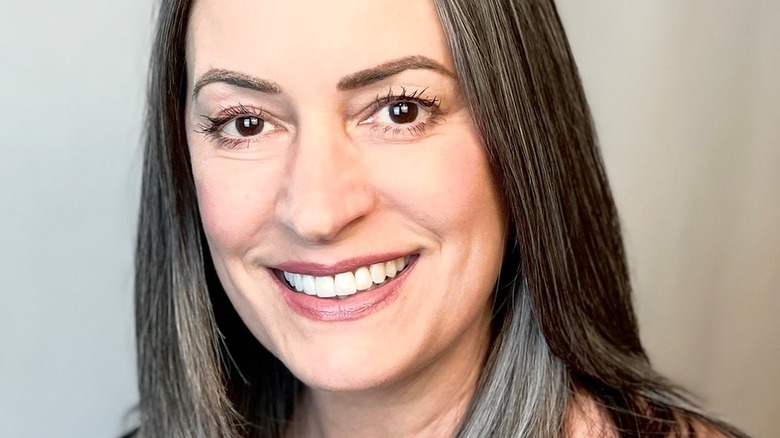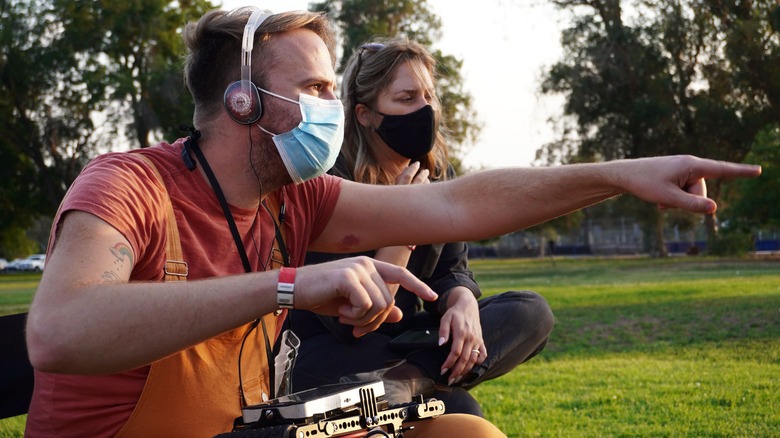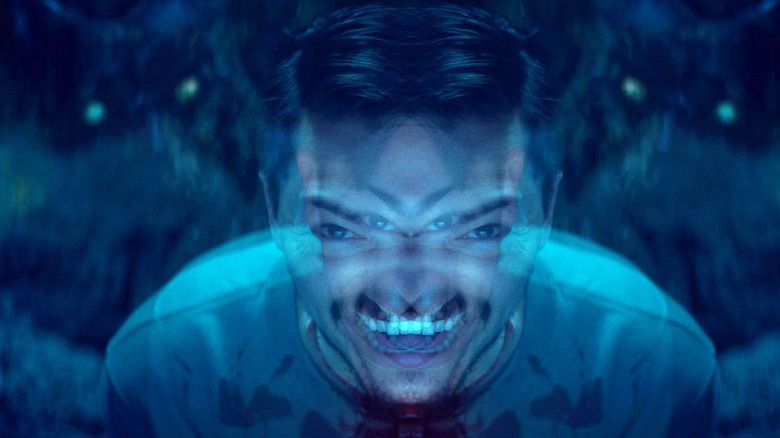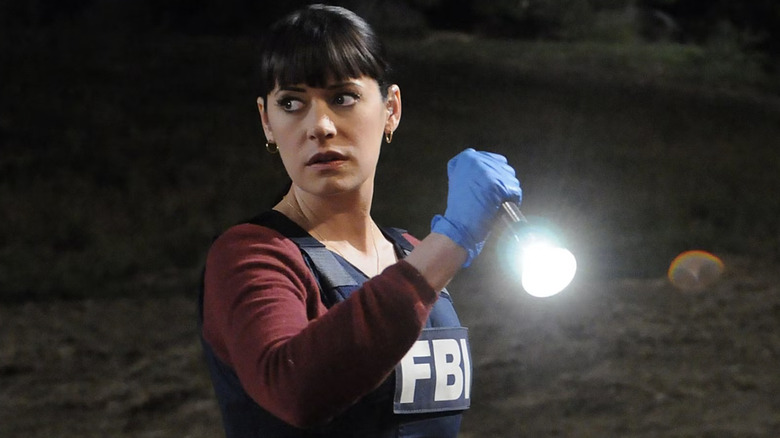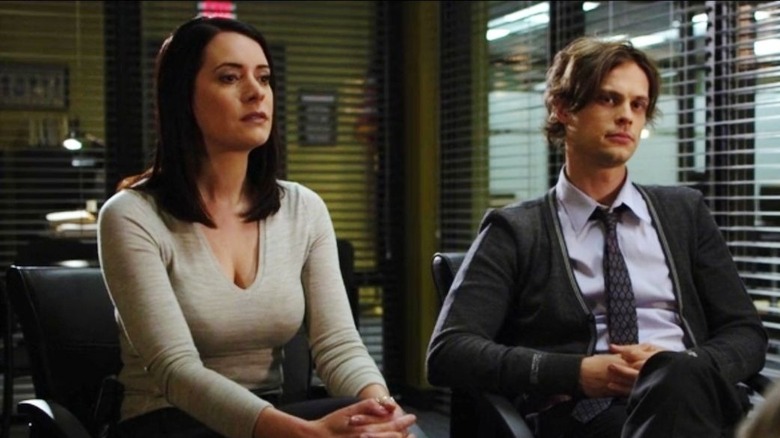Paget Brewster Discusses Mental Health In Hypochondriac And Her Criminal Minds Return - Exclusive Interview
Due to the nature of the film, this interview contains heavy discussions of mental health, including references to anxiety, depression, and suicidal thoughts.
The horror genre is often chock full of problematic tropes when it bothers to feature representation, but Paget Brewster's new film "Hypochondriac" is changing the name of the game. Instead of making the LGBTQ+ aspect of the film the catalyst for the movie's horror elements, "Hypochondriac" celebrates the queer DNA of the film without fearmongering in the community.
Not only does the movie shed light on the flawed medical care so many people coping with mental health diagnoses receive, but it normalizes patients advocating for themselves even when they're brushed off by doctors who don't take them seriously. In between the empowering moments comes mind-bending horror as viewers are trapped in Will's (Zach Villa) mind as he struggles to decipher his haunting past from what's happening in real-time.
Brewster, who plays a psychiatrist in the film, is no stranger to projects that study the human condition. She played Behavioral Analysis Unit Agent Emily Prentiss on "Criminal Minds" for over a decade. Brewster has been a TV staple since the late '90s when she had a six-episode stint as Kathy in "Friends." From there, she went to score roles in projects like "Love & Money," "Law & Order: Special Victims Unit," "Community," "Grandfathered," "American Dad," and recently, "How I Met Your Father."
In addition to her TV roles, Brewster starred in films like "Man of the House," "Unaccompanied Minors," "Uncle Nick," and "Welcome to Happiness." During an exclusive interview with Looper, Paget Brewster discussed the critical mental health topics in "Hypochondriac," what drew her to the film, and whether or not "Criminal Minds" helped prepare her for the role. She also talked about doing the "Criminal Minds" reboot without Matthew Gray Gubler and why she supports his choice to step back.
Hypochondriac: A genre of its own
"Hypochondriac" is such a unique character study. What drew you to the role, and how do you think it sets itself apart from other films in the genre?
I don't know if there are other films in the genre. Are there? Is there something you could compare it to? I don't know what that would be.
I watched it, and it's pretty unique in itself.
That's why I loved it. I read it, and frankly, I didn't want to do it because it was right in the middle of the pandemic, and I was nervous about leaving the house because we didn't really know that much about COVID. Bay Dariz, the producer, sent me the script that Addison Heimann had written. I thought, "Oh no, it's an indie film and a first-time director. I hope this is terrible. I could say, 'No, it's not my thing.' I just want to lay on this couch."
I read it, and I [said], "God, this is brilliant. I have to do it." I called back and [said], "Yes, please let me play the doctor. I want to do it," and it turned out even better than what I imagined.
This is why I'm not a director. I thought it was a great script, but I didn't know [how] it would turn out. It's an extraordinary film, and I'm really proud of it. To me, there is no other film in this genre. I've never seen anything like it. I've never seen a film follow a character so compellingly.
Part of the horror is his mental instability because he's suffering from childhood trauma that manifests itself by feeling pain. He doesn't know what it is, and is he hurting himself, or is he hurt? What is this wolf figure that's stalking him? Is it in his mind, or is it real in this descent into madness? Trying to figure out what's wrong with him by going to doctor after doctor and psychiatrist, I thought, was really beautifully done, and I've never seen anything written quite like that.
I would say [one similar film is] "Jacob's Ladder," which was a movie from a long time ago that had some interesting stuff in it about what is real and what is not. I really thought this was a completely unique movie.
Asking for help when you need it
You play a psychiatrist in the movie. Why do you think it's so important to raise awareness about mental health struggles and how we can help people dealing with conditions like anxiety, bipolar disorder, and schizophrenia?
As a society, and maybe I'm being naïve or overly hopeful, but we're learning more about how to recognize, accept, and aid people who are struggling. We are getting better at offering people the opportunity to say, "I'm having a hard time, and I need help."
I remember Michael Phelps, the Olympic swimmer, set up a foundation. [Prior to the foundation], he was doing public service announcements saying, "If you're struggling and you need help, it's okay to ask for it." That created a major shift. It's not a family secret: "Let's hide this. Don't talk about aunt Janie and brush it under the rug."
It's something we all have to be aware of, and there are public service announcements now for teenagers. Two kids are sitting on bleachers, and one friend turns [to] the other and says, "Hey, is something bothering you?" In that ad, there's a shark chewing on the other teenager's leg, and the idea [is] that it's okay to talk about it. It's okay to ask for help.
There has been a shift towards a healthier way to look at anxiety, depression, bipolar, [and] suicidal ideation. There's a way now for us to talk about it and recognize it that didn't exist before. Addison, the writer, and director of "Hypochondriac," had a mental breakdown and actually wrote the script to process what he had been through.
When a friend read it and [said], "You got to make this movie, man," [Addison] said, "You think we can get financing?" They did. It was a process of studying his own struggle with trying to get a diagnosis of what was going on with him. He came up against different people in the medical profession that treated him differently. "Brah, it's nothing. It's not a problem," or, "Okay, you need drugs."
He kept running into dead ends. You feel the frustration and pain and, frankly, comedy in "Hypochondriac' that Addison dealt with in going through his journey.
If you or someone you know needs help with mental health, please contact the Crisis Text Line by texting HOME to 741741, call the National Alliance on Mental Illness helpline at 1-800-950-NAMI (6264), or visit the National Institute of Mental Health website.
If you or anyone you know is having suicidal thoughts, please call the National Suicide Prevention Lifeline by dialing 988 or by calling 1-800-273-TALK (8255).
The depths of the human psyche
"Hypochondriac" has some pretty similar vibes to "Criminal Minds" in delving deep into the dark corners of the human psyche. Did you find that playing Prentiss helped you at all dive into the film's emotional material?
I wasn't aware of it. That's a really interesting question because I played Prentiss for so long that it's embedded in me. I wouldn't even recognize [it] because it's such a component of my character, myself, my id, that I wouldn't even know, "Oh yeah. I'm aware of this from playing Prentiss."
I look good in navy blue. That came from the bulletproof vest. I wore navy in "Hypochondriac," but that sounds like a really flippant answer. I don't know if it informed how I looked at it. I wanted to service the script that I read and the writer, director, and Zach Villa, who plays Will, because I admire him so much and was so excited that I got to work with him.
He turned out to be even more of a dream than I thought, because it's such a difficult part to play. As an actor, he could have been protecting himself and very insulated and inward and not welcoming or not generous, and I would've understood that. Playing the part he was playing is really emotionally upsetting and exhausting, but in person, he was [like], "Oh, hi. Hey, I'm so happy you're here. Lovely."
It was easy being empathetic and quiet and listening in working with him. As an actress and playing that psychiatrist, it was very easy. He made everything very easy, and he had the hardest job of all. I can't speak more highly of him.
Saying goodbye to a Criminal Minds staple
Speaking of "Criminal Minds," Matthew Gray Gubler has been a part of "Criminal Minds" since you signed on, but he's not in the reboot. Was it weird at all not having him there during filming, and can you tease anything about where Prentiss and the rest of the BAU are during the reboot?
Matthew was the only person in the last two seasons that had been in every single episode. He did 15 years straight through. From 25 to 40, the guy was on one show, and that's when we shot 22, 24 episodes a year. He was never able to go do other stuff, so I understand. He wants to direct. He graduated from NYU to direct, and his first audition was "Criminal Minds."
Imagine you never expected to be an actor and then suddenly it's 15 years of your life. I understand why. I'm hoping he changes his mind, but I understand why he wants to do other things. I was gone from "Criminal Minds" for four years. I got to do a ton of other things that enriched my life and my resume, and my education, so I understand how he feels.
Daniel Henney is on "Wheel of Time" [that] shoots in Prague. They're picked up for a few more years. Daniel won't be able to rejoin us, but life is weird, and things happen. We don't know what's going to happen. I can't tell you what I know about where we are — where "Criminal Minds" starts up — but I can tell you it's really good. We start shooting [on] August 8th. That's all I can tell you.
"Hypochondriac" premieres in select theaters July 29 and will be available on demand and digital August 4.
This interview has been edited for clarity.
